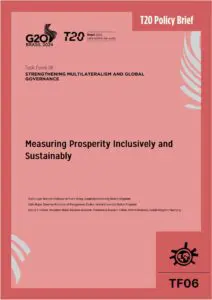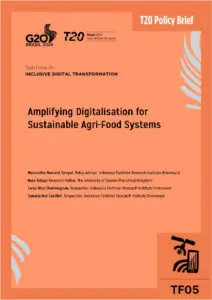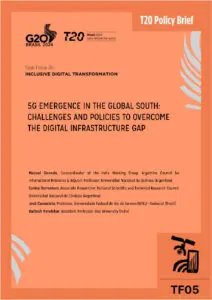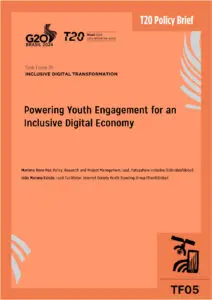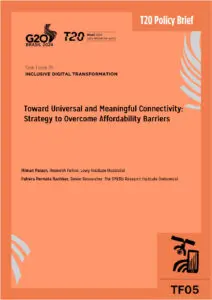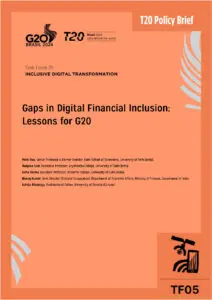We propose that the Group of Twenty (G20) enhance voluntary collaboration on cooling. International cooperation for energy-efficient and sustainable cooling requires enhanced G20 joint leadership that strengthens existing initiatives, helps develop synergies, and addresses the new cooling challenges presented by the COVID-19 pandemic. Safer air conditioning systems and cold chains for vaccines are urgently needed. Stimulus measures can retrofit old buildings and equipment to boost efficient cooling while phasing out harmful refrigerants and promoting a circular economy. To be led by countries with the greatest interest, enhanced collaboration can pool together experiences and expertise enabling more effective policy coordination and impact.
Challenge
Why does the Group of Twenty (G20) need enhanced cooperation on cooling?
Higher temperatures, populations, and incomes have increased human reliance on cooling, making it one of the top drivers of global electricity demand (IEA 2018). The Group of Twenty (G20) countries are primarily responsible for this growth, where 1,773 TWh of energy was consumed for cooling buildings in 2018—a 139% increase from 742 TWh in 2000 or a compound average growth rate of 4.95% per year (see Figure 1). This G20 demand accounts for 82% of the global air-conditioner (AC) demand. The US, China, and Saudi Arabia alone account for 70% of the G20 AC electricity demand (see Figure 2) (Enerdata 2019).
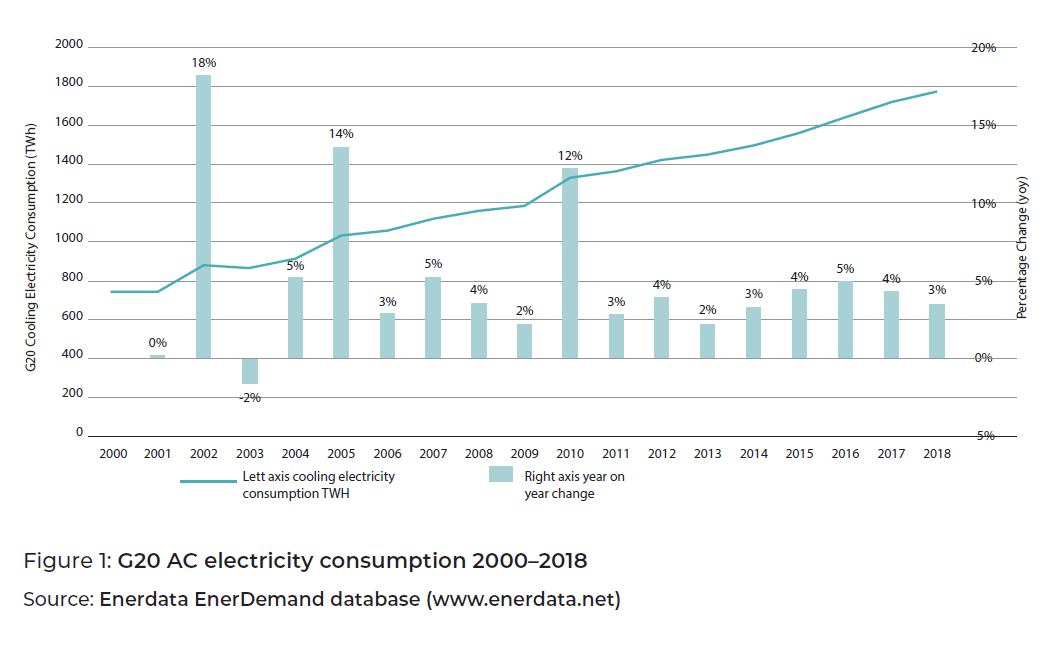
The AC demand in Figure 1 does not include energy for refrigeration or mobile cooling used in transport within the “cold chain.” Mobile cooling, which is vital for the medical and food supply industries, consumes almost 2 million barrels of oil per day (IEA 2019).
The majority of cooling equipment sold today relies on HFC refrigerants, which are industrial chemicals thousands of times more powerful per unit of mass than CO2 in terms of their global warming potential. Regarding cooling-related greenhouse gas (GHG) emissions, around 71% relate to energy and 29% to refrigerants (UNEP 2018).
Over the next 30 years, the overall demand for cooling is projected to triple, as an extra 6 billion cooling appliances are added to the existing stock of 3.6 billion. Such an increase would be the equivalent of the current combined electrical capacity of the US and Germany. This growth could lead to HFCs accounting for 20% of total GHG emissions by 2050 (Enerdata 2019; Kigali Cooling Efficiency Program 2020).
Cities such as New Delhi (Abhyankar et al. 2017) and Beijing (IEA 2018) already use half their electricity to run ACs during the summer. Even in France, the demand for ACs in 2018 grew by almost 200% from 2017 (IEA 2018). In India, AC ownership increased from 2 to 14 million units between 2006 and 2016; it is forecasted to reach 200 million by 2030 (Natural Resources Defense Council 2013). Saudi Arabia, which hosted the G20 in 2020, has a special interest in cooling. Studies suggest that 66–70% of household electricity consumption is attributed to ACs, therefore accounting for the highest share of household electrical consumption in the world (Howarth et al. 2020; Krarti, Aldubyan, and Williams 2020).
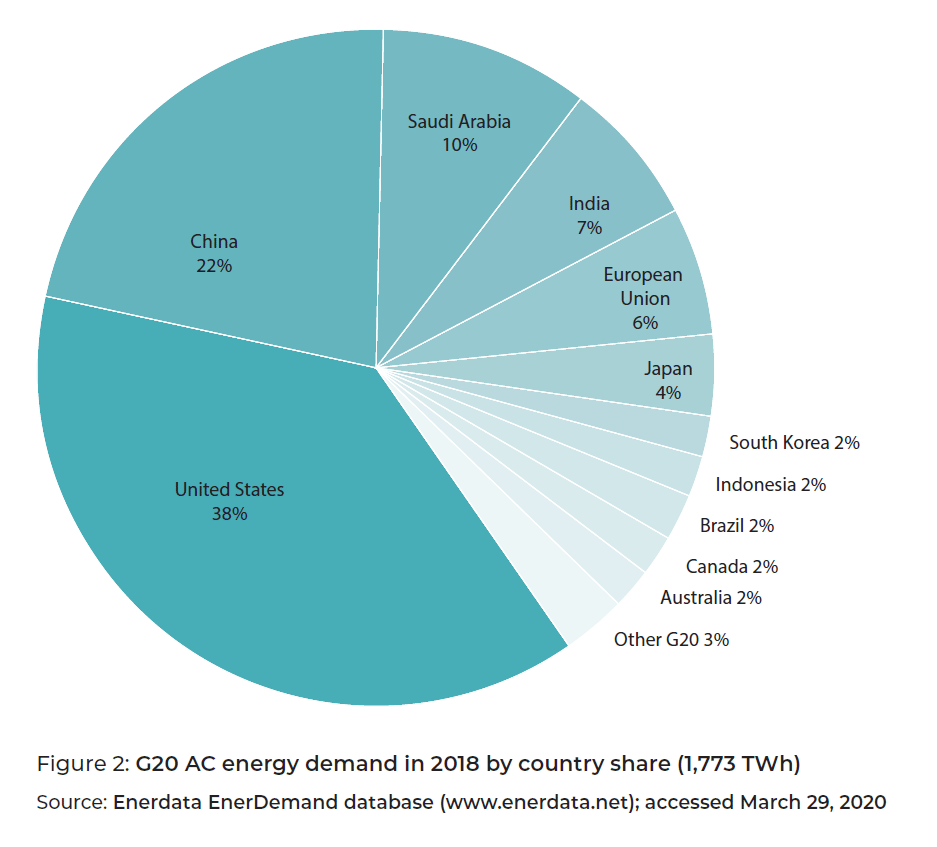
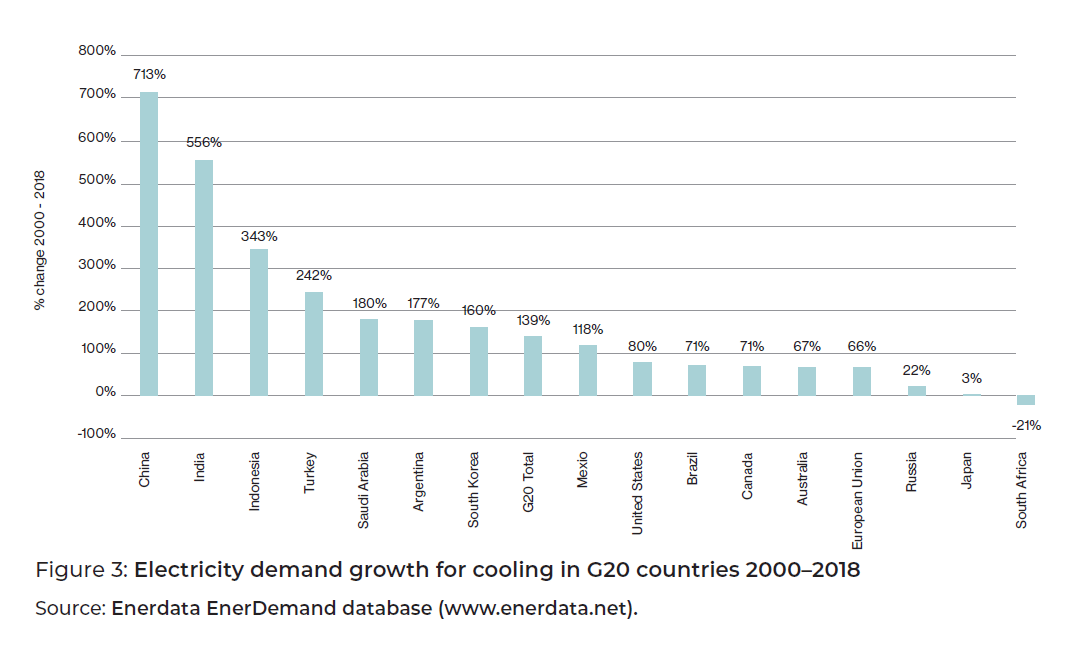
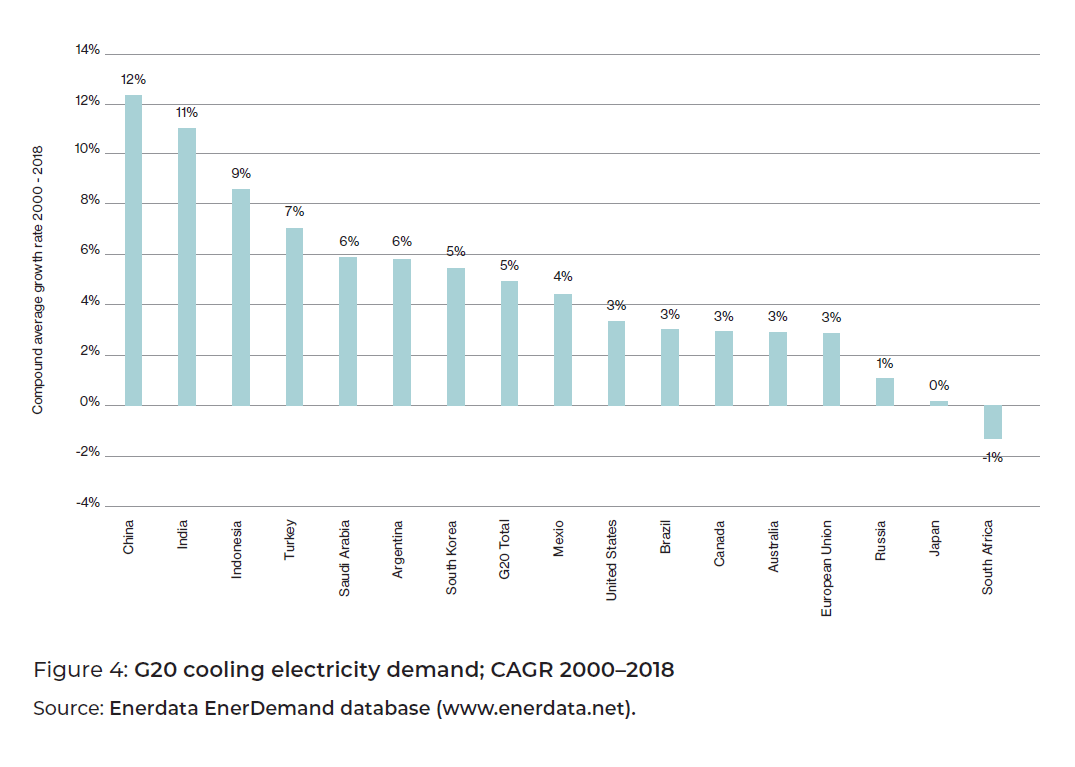
The need for universal access to cooling is not a luxury, but an issue of equity and a service that must be provided to unlock development. According to the UN Sustainable Energy for All (2019), 1.05 billion people lack access to cooling and a further 2.2 billion have inefficient cooling. The World Bank estimates that the lack of cold storage and refrigerated transport contributes to 1.5 million vaccine-preventable deaths each year. Simply halving food loss through better refrigeration and cold chains in food supply would feed 1 billion undernourished people annually (World Bank 2019a; 2019b).
By combining energy efficiency improvements with the transition away from superpolluting refrigerants, the world could avoid cumulative GHG emissions of up to 210– 460 gigatons of CO2-equivalent over the next four decades. This would be roughly equivalent to four to eight years of total annual global GHG emissions, based on 2018 levels (IEA 2020a).
The strategic importance of cooling is clearly evidenced by long-term temperature trends and shifts in temperature extremes. The three hottest major G20 cities are Jakarta, Riyadh, and New Delhi, where the mean annual temperature is between 25 and 27 °C. Although Jakarta is the warmest city, its average summer temperature (26.7 °C) is lower than that of Riyadh (36.6 °C) and New Delhi (31.3 °C).
Summer average temperatures are also increasing faster than yearly temperatures in 9 of the 19 major G20 cities. The highest rate of summer warming is in Rome (+3.0 °C), Riyadh (+2.8 °C), Berlin (+2.5 °C), Paris (+2.4 °C), and Istanbul (+2.3 °C) (Figure 5). In Rome, Berlin, and Paris, the daily maximum average temperature during June– August has increased by more than 3°C in the past four decades (Figure 6).
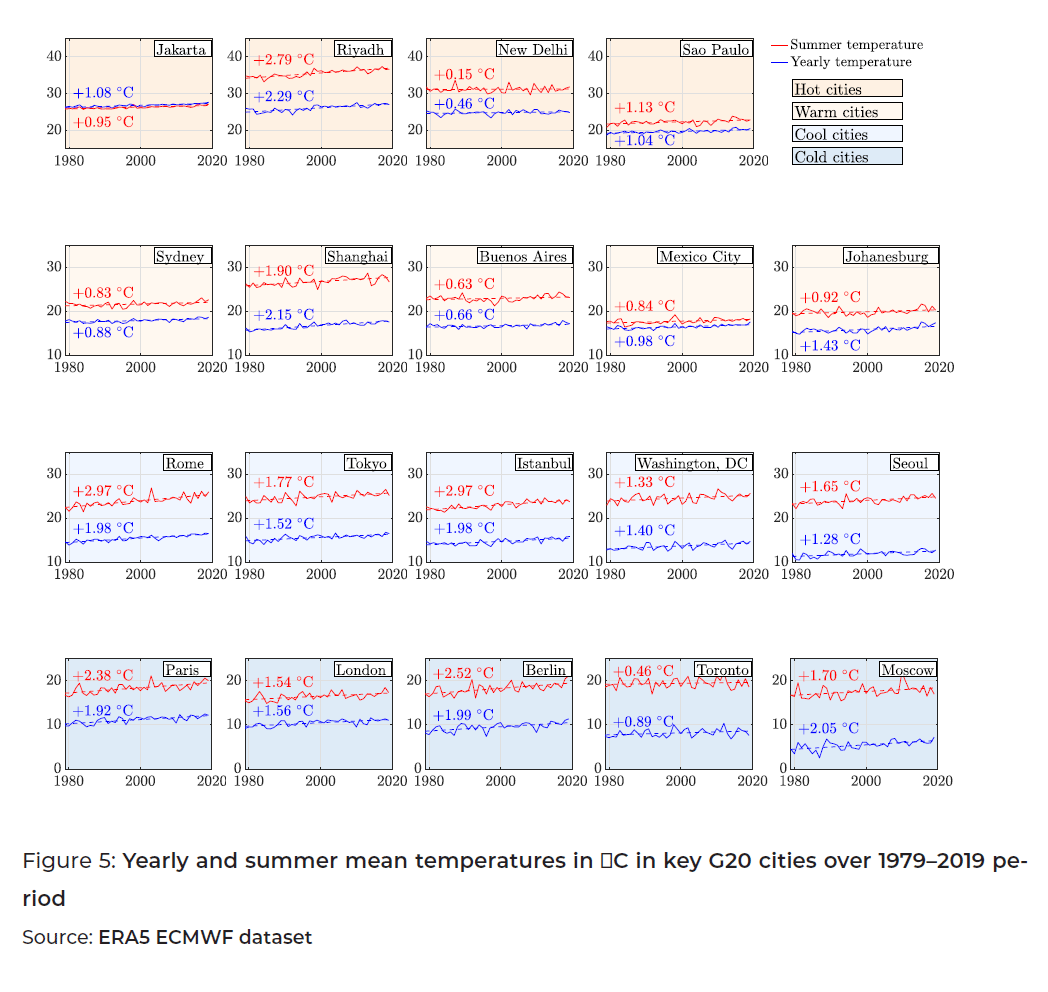
Temperatures are also rising much faster in cities than the average surface temperature of the planet (Figure 7). This puts international targets that aim to limit global average temperature change to 1.5 °C or 2 °C into perspective. For example, 2 °C of global warming may mean a further 6–10 °C of warming for Riyadh in the summer, pushing the limits of humans’ capabilities to adapt to the weather. The fastest annual warming is in Riyadh (+2.3 °C), Shanghai (+2.1 °C), Moscow (+2.1 °C), Berlin (+2.0 °C), and Paris (+1.9 °C).
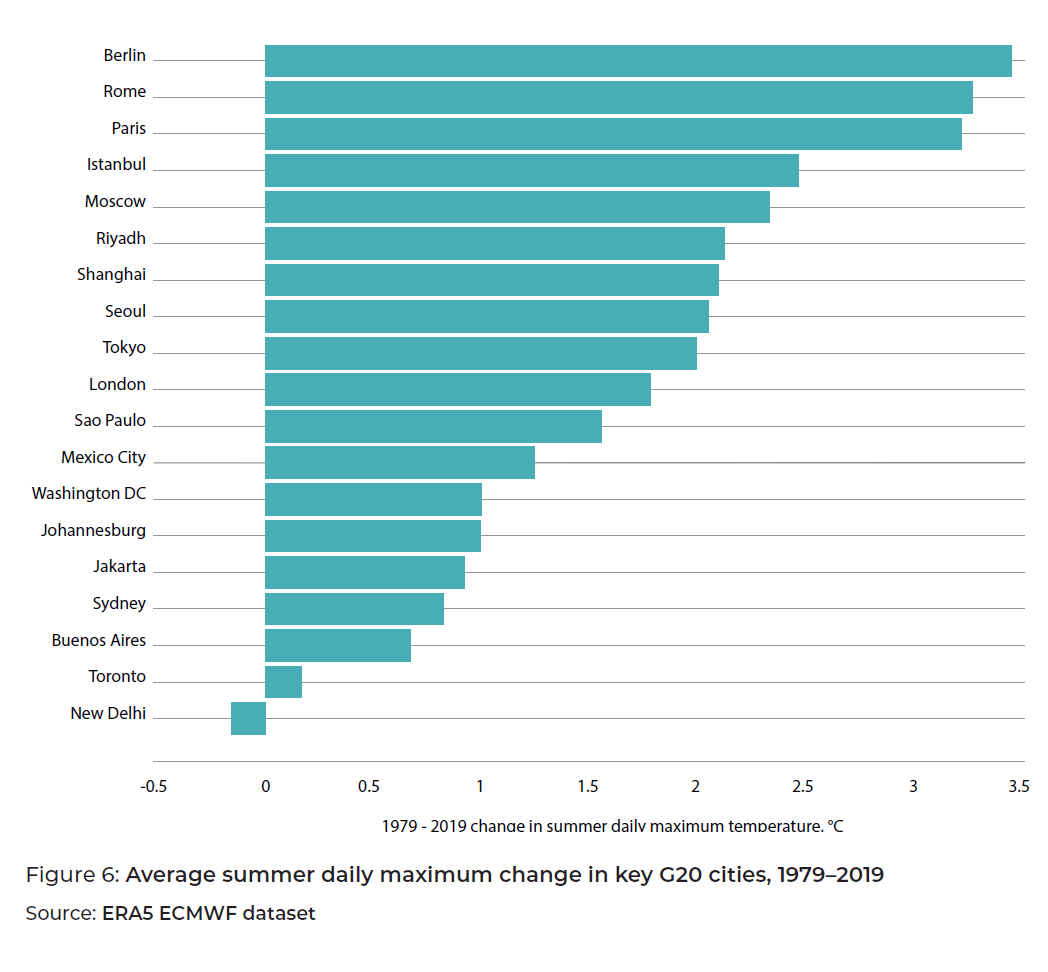
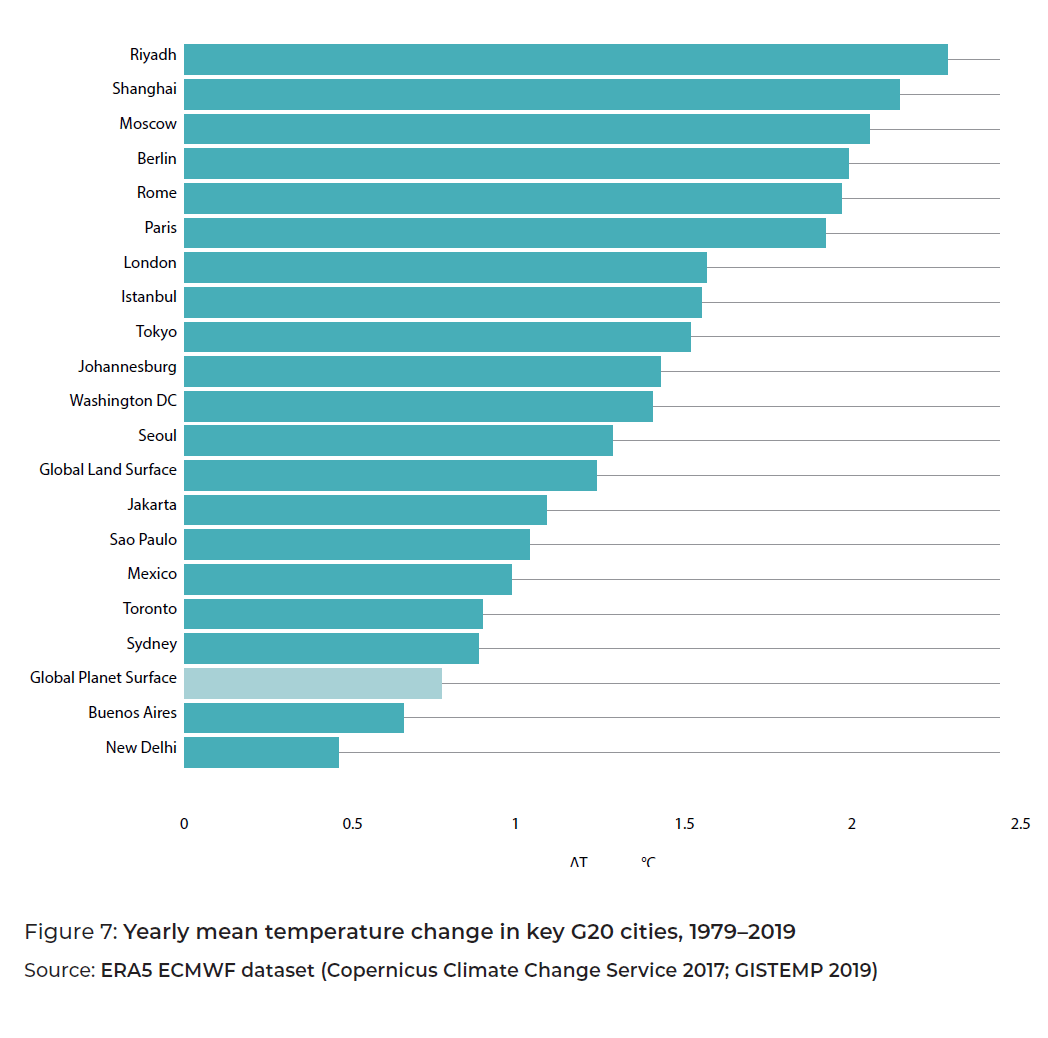
Proposal
Enhancing voluntary cooperation on cooling in the G20
There are few countries in the world where cooling is more essential to life than in Saudi Arabia. Because of its fundamental importance to development and wellbeing, the Kingdom’s 2020 G20 Presidency is an ideal opportunity to elevate cooling as a global strategic priority.
It is essential that any enhanced cooperation on cooling at the G20 level recognizes and does not duplicate existing G20 and other international efforts. Such international agreements and initiatives have been delivering important results for governments. Nevertheless, they could all benefit from enhanced collaboration from G20 countries in order to broaden membership, increase resourcing and commitment, and to better coordinate and learn from best practices, especially given the emerging policy needs presented by COVID-19.
Energy efficiency is already a major priority for G20 cooperation, and cooling and air conditioning is an essential element of this objective. Cooperation has been key to the G20 Energy Efficiency Leading Program and associated task groups that have been led by smaller groups of countries. These include the G20 Buildings Energy Efficiency Task Group, G20 Super-Efficient Equipment and Appliance Deployment Initiative, Clean Energy Ministerial’s Advanced Cooling Challenge, and G20 Task Group on District Energy Systems.
This G20 work is supported and complemented by other international agreements and initiatives. A major one among these is the important international agreement to phase down HFCs through the Kigali Amendment to the Montreal Protocol (Appendix A). Other initiatives include:
- The Biarritz G7 Pledge for Fast Action on Efficient Cooling (Appendix B)
- The Climate and Clean Air Coalition’s programs on Efficient Cooling and HFCs
- The Cool Coalition
- The Kigali Efficiency Program and Principles for National Cooling Plans
- The World Bank’s Efficient Clean Cooling Program
- The Sustainable Energy for All Cooling for All Program
- The Rocky Mountain Institute Global Cooling Prize
- The European Partnership for Energy and the Environment’s Count on Cooling • The Green Climate Fund’s Green Cooling Initiative
- United Nations Environment Programme’s (UNEP) Refrigerant Driving License
- COP 26 – UK Government support for cooling
- The International Energy Agency’s (IEA) Technology Collaboration Program on Energy Efficient End Use Equipment
- UNEP’s United for Efficiency Program and model AC regulation guidelines
- UNEP’s District Cooling Initiative
- Collaborative Labeling and Appliance Standards Program’s (CLASP) Cooling and Energy Efficiency programs
- The Energy and Resources Institute’s Alliance for Sustainable Habitat, Energy Efficiency and Thermal Comfort for All
- UN Basel Agency for Sustainable Energy’s Cooling as a Service Initiative
- UNEP’s Global Alliance for Building and Construction
- The University of Oxford’s Future of Cooling Program
Enhanced collaboration on cooling at the G20 level is urgently needed in order to:
- draw on the experience and the lessons learned from the role cooling systems can play in reducing the spread of COVID-19 indoors,
- achieve greater impact across international cooling agreements and initiatives through broadening membership and more effectively using scarce resources through improved collaboration, and
- provide a strong G20 statement on cooling similar to the Biarritz Pledge to reinforce efforts and attract greater resources to the cooling challenge.
For example, the work program of the G20 Task Group on District Energy Systems co-led by Saudi Arabia, Russia, and China is still to report on progress, despite several years since initiation. This Task Group could be reinvigorated through closer cooperation with the UNEP’s District Cooling Initiative and with technical support through institutions such as the IEA, King Abdullah Petroleum Studies and Research Center, and King Abdullah University of Science and Technology.
While the ultimate scope for enhanced collaboration should be determined such that it best meets the G20 countries’ needs, the review and consultation process conducted in preparing this policy brief has helped identify 11 priority areas for “cool collaboration,” which could lead to immediate and strong benefits in addressing the cooling challenge.
Priority areas for cool collaboration at the G20 level
1. Accelerated ratification and implementation of the Kigali Amendment
In 2016, 197 countries agreed, through the Kigali Amendment to the Montreal Protocol, to phase down the production and use of HFCs. As of July 2020, more than 98 countries have ratified the Kigali Amendment. The status of G20 country ratification is summarized in Appendix A. Nine G20 countries—China, India, Indonesia, Turkey, Saudi Arabia, United States, Brazil, Russia, and Italy—are yet to ratify the agreement. We recommend that the G20 call for its fast ratification and establish a process whereby member countries can be mutually accountable.
2. Pooling experiences on the role of cooling in containing the spread of COVID-19
The COVID-19 pandemic is creating higher demand for indoor air quality. Thus, changes are needed to establish better design, natural and hybrid ventilation, “heating, ventilation, and air conditioning” equipment configuration, and air filtration systems. Specific recommendations may have to be updated frequently in response to the evolving nature of the pandemic (Hazma-Goodachre 2020).
There is an urgent need to develop incentives for technologies suitable to sterilize air in order to destroy COVID-19 and other viruses in cooling and heating systems, and, thus, make buildings and public transport systems, including aviation, safer. For example, cold plasma is a low-GWP technology that could have significant and beneficial impact (Shi et al. 2019).
Once a vaccine is developed, there will be a race to produce and dispatch doses globally. Vaccines, to be effective and safe for use, need to be stored in a specific temperature range, typically 2–8 ºC. Thus, cold chains need to be established where they currently do not exist.
3. Adoption of a G20 Pledge on Efficient and Safe Cooling
In 2019, international leaders adopted the Biarritz G7 Pledge for Fast Action on Efficient Cooling, which included a mandate to “recruit other heads of state and government and private sector leaders to join in these efforts in order to gain political momentum and encourage the mobilization of additional financial resources from public and private actors” (Appendix B). Adapting the Biarritz Pledge for Fast Action on Efficient Cooling at the G20 level offers governments a quick win using an existing and holistic framework.
4. Enhance voluntary collaboration to help achieve greater impact of existing initiatives
There is an opportunity to position “Energy Efficiency in Cooling” as an overarching theme covering a wide spectrum within the G20. This includes the market transformation for energy efficient equipment, integration of passive cooling design, urban planning, cold chain management, leveraging of digitalization, and facilitating financing models. A holistic approach is also critical to achieving the Biarritz Pledge. One solution to ensure synergy would be to house the secretariat for a new voluntary platform in one of the existing programs or coalitions, such as the Cool Coalition, IEA Energy Efficiency Hub, or the Climate and Clean Air Coalition. Besides increasing effectiveness through enhanced cooperation, a voluntary G20 cooling platform could help avoid duplication and increase synergies.
5. Identify a coordinated schedule for phasing out the most inefficient technologies and accelerating the adoption of the best available technologies
Minimum energy performance standards (MEPS) are one of the most important and proven tools to raise the efficiency of ACs. While around 82 countries have MEPS in place, MEPS still fall far below the best practices, leaving a large gap between what is sold in the market and what is technically possible (Figure 8).
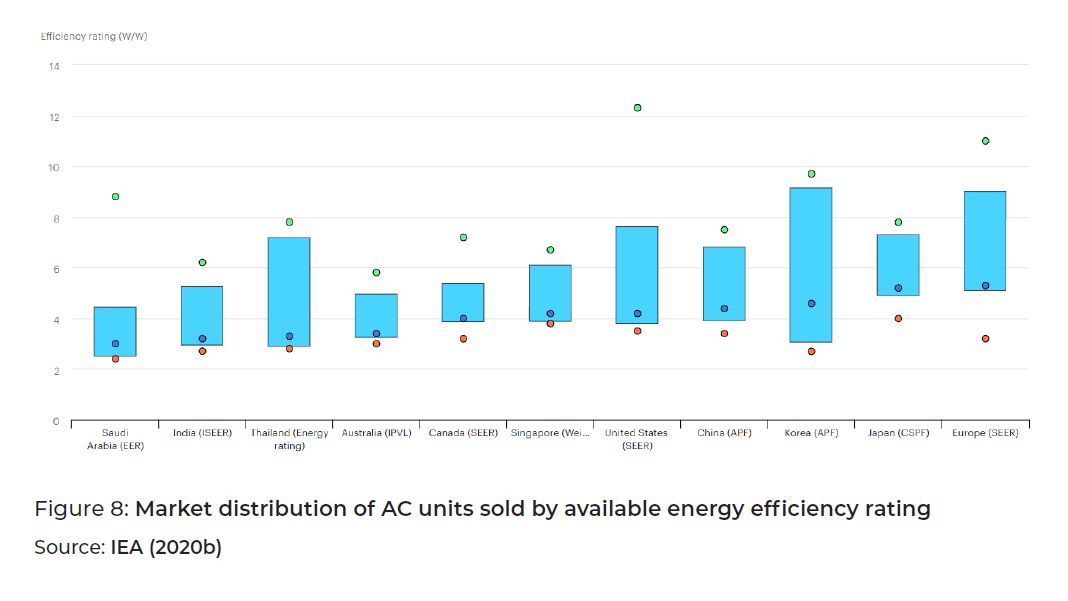
While the concept of aligning the MEPS at the global level may be appealing at first glance, national and regional differences should never be underestimated. Nevertheless, the IEA estimates that the cumulative investment and running costs of power generation could be reduced by $3 trillion between now and 2050 through stronger MEPS for cooling (IEA 2020a).
Enhanced cooperation at the G20 level could identify the most inefficient AC units for staged phase-outs, such as window units and non-inverter AC technologies, which are already effectively banned in most countries (Figure 9). This goal could follow the successful global phase-out of inefficient lighting.
Notably, efficiency and refrigerant standards interact. For example, efficiency requirements are closely related to the refrigerant charge size. In the case of flammable refrigerants, the charge size may be limited because of safety reasons, which “caps” the achievable efficiency with certain refrigerant types. G20 action in this area could help achieve more joined up thinking in the relationship between phasing out harmful refrigerants and increasing energy efficiency.
6. Support research and development into next-generation super-efficient, COVID-19-safe, and low GWP AC appliances and other cooling equipment, and make them available worldwide at affordable prices
While improving the MEPS and linking them more strongly to best available technologies can deliver large immediate gains, there is still a considerable research and innovation gap to identify commercially viable high efficiency, low GWP refrigerant units. The International Finance Corporation’s (IFC) TechEmerge Sustainable Cooling Program is one important initiative, and the Rocky Mountain Global Cooling Prize is encouraging a residential cooling solution that will have at least five times less climate impact than standard residential room AC units in the market today. Within Saudi Arabia, King Abdullah City for Atomic and Renewable Energy’s renewable energy program sponsors innovative projects that integrate renewable energy with cooling. King Abdullah University of Science and Technology’s program on the future of cooling has also involved developing innovative solutions (Choon et al. 2019). Along with funding for research and development, sponsoring prizes can be an effective way to find innovative solutions, especially for safe COVID-19 filtration systems. Stronger mechanisms are also needed to link such initiatives to regulators in setting dynamic MEPS and best available technology standards.
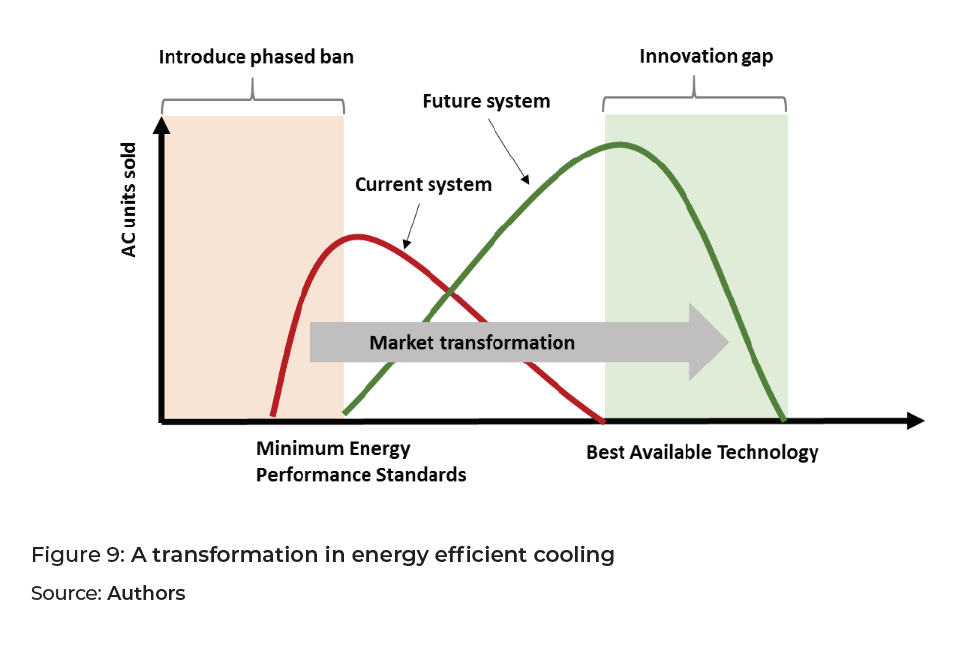
7. Enhance trade and technology transfer in high-efficiency products and support the design of anti-dumping policies in developing countries to prohibit the import of inefficient and obsolete technologies—new and used—from G20 countries
In less developed nations, preventing the import of obsolete and low-efficiency cooling equipment requires urgent attention. For example, environment ministers of African nations highlighted this during the 17th Conference of African Environment Ministers Conference in November 2019. A recent CLASP report finds that very lowefficiency room ACs make up 35% of the overall room AC sales in developing countries (CLASP 2020). In manufacturing countries, such products are not sold.
8. Encourage greater adoption of digital and non-AC cooling solutions such as smart systems, building design, and sustainable urban design and green spaces
“Cooling for all” does not necessitate an AC or refrigerator in every home. Building designs for cooling include the use of shading and high albedo paints for cool roofs, smart surfaces, building orientation, thermal mass, and increased use of green spaces. These solutions can be coupled with the use of digital control systems for AC management and thermostats that only cool buildings when occupants need them. Heat pumps can be effective in providing warmth in winter and cooling in summer. For example, the UNEP’s Global Alliance for Buildings and Construction, co-chaired by the World Business Council for Sustainable Development and France, is mobilizing the building, construction, and real estate value chain based primarily on energy efficiency and building designs (Global Alliance for Buildings and Construction 2020).
9. Financing and utility regulation to overcome behavioral market failures
Highly efficient cooling products using low-GWP HFCs, or other climate friendly alternatives, often reach the market with higher up-front costs. Most often, purchasing decisions are driven by the initial purchase price of the AC unit than the life-cycle cost of operating it to deliver the cooling service. Innovative financing mechanisms under the G20 Energy Efficiency Financing Task Group can be directly applied to cooling.
10. Achieving better efficiency at lower costs through public sector purchasing and private “buyer clubs”
In most countries, governments are large customers for cooling equipment. Energyefficient cooling can achieve large life cycle savings for public budgets. For example, public procurement strategies have been successfully deployed in India through the government agency Energy Efficiency Services Limited. This approach was initiated with the promotion of LED bulbs, which helped lower the price of an LED bulb from $5 to 60 cents in only two years. This made LED bulbs the preferred lighting option in India (Kamat, Khosla, and Narayanamurti 2020).
In 2017, India issued its first public procurement of super-efficient air conditioners with a $68 million bulk purchase, with a 30% price reduction for the most energy-efficient room AC available. In 2019, a bulk procurement for room ACs resulted in equipment that was 40% more efficient with a 30% reduction in price.
Private procurement, or “buyer clubs,” are being organized in Morocco for lower-GWP room ACs, and in Brazil by manufacturers for purchasing inverter/motor/compressor components used in the most efficient ACs. Other examples include the US’s Federal Energy Management Program and the energy efficiency work of the World Bank in Saudi Arabia.
11. Support global food security through reliable and efficient cold food chains
The International Institute of Refrigeration estimates that more than 200 million tons of perishable foods could be preserved if developing countries had the same level of cold chains as found in the developed world. More than 1,600 million tons of food are wasted every year, with 63% of food losses occurring in developing countries. With an expected increase of 40% in global food demands by 2030, dire shortages are foreseen in food supply, especially in India and East Asia, if action is not taken (Birmingham Energy Institute 2014). Improving cold chains could potentially feed 950 million people yearly (Food and Agriculture Organization 2018).
Key Recommendations
Led by countries with the greatest interest, we recommend that the Group of Twenty (G20) enhance international collaboration on sustainable cooling by pooling experiences and expertise on urgent issues, especially in the context of the COVID-19 pandemic. Our recommendations include:
- Encourage fast implementation of the 2016 Kigali Amendment of the Montreal Protocol to phase down hydrofluorocarbons (HFCs), which is signed by 197 countries, ratified by 98 countries, and pending ratification by 9 G20 countries.
- Make a strong declaration similar to the G7’s Biarritz Pledge for Fast Action on Efficient Cooling.
- Combine knowledge on solutions, policies, and best practices for safe ventilation and filtering of air in order to prevent the indoor spread of COVID-19 and other viruses.
- Support global access to vaccines though reliant and efficient medical cold chains.
- Collaborate for stronger impact on cooling through initiatives such as the G20 Energy Efficiency Leading Program and Task Group on District Energy Systems.
- Phase out the most inefficient technologies and accelerate the adoption of the best available technologies, with regular updates in response to each product’s innovation cycle.
- Encourage higher adoption of digital and non-air conditioning (AC) cooling solutions such as smart grids, building design, urban planning, and green spaces.
- Boost funding for next-generation high-efficiency, safe, low global warming potential (GWP) ACs and other cooling equipment that would effectively control COVID-19 transmission, without aggravating climate change.
- Enhance trade of and technology transfer in high energy efficiency products and design of anti-dumping policies in developing countries in order to prohibit the import of both new and used obsolete technologies.
- Support global food security through reliable and efficient cold chains
Acknowledgement
We are grateful to following individuals who were consulted or reviewed this document: Ashok Sarkar (The World Bank); Jan Braun (KAPSARC); Brian Dean (UNSE4All); Andrea Voigt (EPEE); Koji Kojima (MRI); Melanie Slade (IEA); Kevin Lane (IEA); Nathan Borgford-Parnell (CCAC); Mohammed Khawaldeh (Zamil); Padu Padmanabhan; Thomas Motmans (UN BASE); Paul Kellett (UNEP); Michel Farah (Daikin); Helene Rochat (UNEP); Rory Jordan (KAUST); Kim Choon (KAUST); Omar Abdulaziz (ZCST); Ian Campbell (RMI); Yasushi Tanaka (ECCJ); Wasim Saman (UniSA) and Ridah Sabouni (Energetics).
Disclaimer
This policy brief was developed and written by the authors and has undergone a peer review process. The views and opinions expressed in this policy brief are those of the authors and do not necessarily reflect the official policy or position of the authors’ organizations or the T20 Secretariat.
References
Abhyankar, Nikit, Nihar Shah, Won Young Park, and Amol Phadke. 2017. “Accelerating Energy Efficiency Improvements in Room Air Conditioners in India: Potential, Costs-Benefits, and Policies.” Accessed June, 2020. https://www.nrdc.org/sites/default/files/air-conditioner-efficiency-IP.pdf.
Birmingham Energy institute. 2014. “The Prospects for Liquid Air Cold Chains in India.” Accessed June, 2020. https://www.birmingham.ac.uk/Documents/news/Theprospects-for-liquid-air-cold-chains-in-India.pdf.
Choon Ng, Kim, Muhammad Wakil Shahzad, Muhammad Burhan, and Seung
Jin Oh. 2019. “Approaches to Energy Efficiency in AC: Innovative Processes and Thermodynamics.” Energy Procedia 158: 1455–1460. https://doi.org/10.1016/j.egypro.2019.01.349.
CLASP. 2020. “Environmentally Harmful Dumping of inefficient and Obsolete ACs in Africa.” Accessed June, 2020. https://clasp.ngo/publications/environmentallyharmful-dumping-of-inefficient-and-obsolete-air-conditioners-in-africa.
Copernicus Climate Change Service. 2017. ERA5: Fifth Generation of ECMWF
Atmospheric Reanalyses of the Global Climate. Reading: ECMWF.
Enerdata. 2019. Future of Air‐Conditioning. Grenoble: Enerdata.
Food and Agriculture Organization. 2018. “The Future of Food and Agriculture Alternative Pathways to 2050. Summary Version” Accessed June, 2020. https://www.fao.org/3/CA1553EN/ca1553en.pdf.
GISTEMP Team. 2019. GISS Surface Temperature Analysis (GISTEMP). “NASA Goddard Institute for Space Studies.” Accessed April 4, 2020. data.giss.nasa.gov/gistemp.
Global Alliance for Building and Construction. 2020. “Decarbonizing Building Value Chain Roadmaps, Including Efficient Cool Spaces.” Accessed June, 2020. https://globalabc.org/our-work/forging-regional-pathways-global-and-regional-roadmap; https://globalabc.org/news/soon-be-launched-regional-roadmaps-africa-asia-andlatin-america-26-march-2020-berlin-germany.
Hazma-Goodachre, Dan. 2020. “COVID is Changing Demand for Cooling; We Need a Climate Friendly Response.” Accessed June, 2020. https://www.climateworks.org/blog/covid-19-might-intensify-the-need-for-climate-friendly-cooling.
Howarth, Nicholas, Natalia Odnoletkova, Thamir Alshehri, Abdullah Almadani, Alessandro Lanza, and Tadeusz Patzek. 2020. “Staying Cool in a Warming Climate: Temperature, Electricity and Air Conditioning in Saudi Arabia.” Climate 8(4) https://doi.org/10.3390/cli8010004.
International Energy Agency (IEA). 2018. The Future of Cooling Opportunities for Energy‐Efficient Air Conditioning Together Secure Sustainable. Paris: International Energy Agency.
IEA. 2019. Cooling on the Move. Paris: International Energy Agency.
IEA. 2020a. Cooling Emissions Policy Synthesis Report. Paris: IEA.
IEA. 2020b. Tracking Clean Energy Progress. Tracking Buildings 2020. Paris: IEA.
Kamat, Ajinkya Shrish, Radhika Khosla, and Venkatesh Narayanamurti. 2020. “Illuminating Homes with LEDs in India: Rapid Market Creation Towards Low-Carbon Technology Transition in a Developing Country.” Energy Research and Social Science 66: 101488. https://doi.org/10.1016/j.erss.2020.101488.
Kigali Cooling Efficiency Program. 2020. “Why Cooling? Kigali Cooling Efficiency Program.” Accessed June, 2020. https://www.k-cep.org/why-cooling.
Krarti, Moncef, Mohammad Aldubyan, and Eric Williams. 2020. “Residential Building Stock Model for Evaluating Energy Retrofit Programs in Saudi Arabia.” Energy 195: 116980. https://doi.org/10.1016/j.energy.2020.116980.
Natural Resources Defense Council. 2013. “Cooling India with Less Warming: The Business Case for Phasing Down HFCs in Room and Vehicle Air Conditioners.”
Shi, Junye, Donglin Han, Zichao Li, Lu Yang, Sheng-Guo Lu, Zhifeng Zhong, Jiangping Chen et al. 2019. “Electrocaloric Cooling Materials and Devices for Zero-Global-Warming-Potential, High-Efficiency Refrigeration.” Joule 3(15): 1200–1225. https://doi.org/10.1016/j.joule.2019.03.021.
UN Sustainable Energy for All. 2019. “Chilling Prospects: Tracking Sustainable Cooling for all.” Accessed June, 2020.
United National Environment Programme (UNEP). 2018. “BRIEFING NOTE A. The Importance of Energy Efficiency in the Refrigeration, AC and Heat Pump Sectors.”
United Nations Environment Programme. Accessed June, 2020. https://conf.montrealprotocol.org/meeting/workshops/energy-efficiency/presession/breifingnotes/briefingnote-a_importance-of-energy-efficiency-in-the-refrigeration-airconditioning-and-heat-pump-sectors.pdf.
World Bank. 2019a. “New Program to Scale up Efficient, Clean Cooling in
Developing Countries.” Accessed June, 2020. https://www.worldbank.org/en/news/press-release/2019/04/24/new-program-to-scale-up-efficient-clean-cooling-indeveloping-countries.
World Bank. 2019b. “Four Things you Should Know about Sustainable Cooling.” Accessed June, 2020. https://www.worldbank.org/en/news/feature/2019/05/23/fourthings-you-should-know-about-sustainable-cooling.



